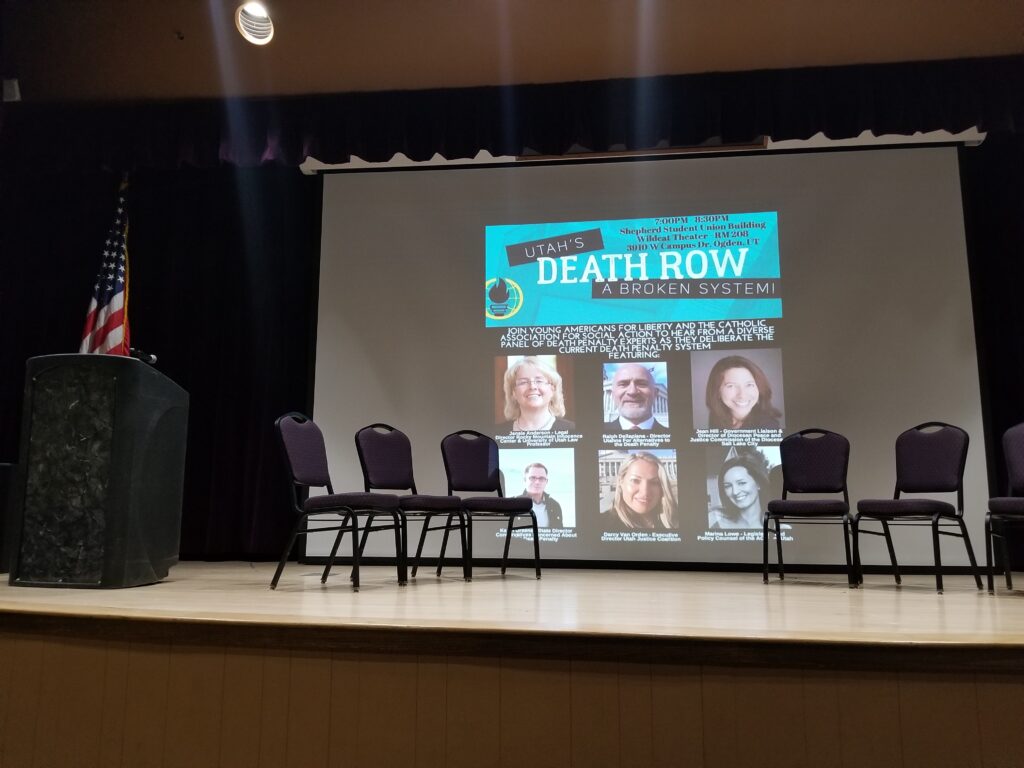Utah Conservatives Concerned About the Death Penalty, in association with Catholic Association for Social Action, hosted a panel discussion about Utah’s system of capital punishment on Jan. 16 at Weber State University.
“In last 15 years, we had 150 eligible cases and only one received a death sentence,” Ralph Dellapiana, a public defender who has defended as many as 26 murder cases, a number of which the state sought the death penalty, said. “The death penalty is extremely expensive and, in Utah, totally ineffective,”
The panel focused on the difficulties raised by maintaining a death penalty system in Utah as well as the monetary and emotional toll on everyone involved.
According to Jean Welch Hill, the Government Liaison and director of the Diocesan Peace and Justice Commission of the Diocese of Salt Lake City, a legislative audit showed a death penalty eligibility case can cost taxpayers at least 1.6 million dollars.
“This is because it is a two-part case as opposed to a more traditional murder trial,” Hill said.
An example Hill provided is that Texas, a state that puts more people on death row than any other, estimates their cost for a death penalty trial to be three times as expensive than someone in prison for 40 years.
The costs come from the additional specialized attorneys and mitigation, which can add up to as much as a thousand labor hours by the end of the death penalty case.
Additionally, picking a jury to decide on the death penalty case can take weeks, while the two-part trial itself will be twice as long and will require twice the amount of lawyers needed.
The case itself can take decades to reach a conclusion, and living on death row is more expensive than a traditional prison.
According to Darcy Van Orden, executive director of the Utah Justice Coalition, the average death row case will experience about 8 or 9 constitutional appeals over the course of 23 years.
“This means every couple of years, the case comes back up and the murder victim’s families come back to trial and all those wounds get opened every single time,” Van Orden said.
Jensie Anderson, the legal director of the Rocky Mountain Innocence Project and University of Utah law professor, said families who initially support a death penalty case don’t feel a sense of closure in the off chance of an execution, and expressed that it doesn’t bring back their loved ones or change the events that took place.
Orden said that not only are the families of the victims affected by a death penalty trial, but the families of the defendant and the staff who work on death row can be traumatized from their experience for years after the case was settled.
The panel also discussed several arguments that have been made in favor of seeking a death penalty, one of which was the possibility of execution being a deterrence for crime.
However, according to Kevin Greene, state director of UT Conservatives Concerned about the Death Penalty, the top ten states that have executed the most people since 1976 experience 7 to 8 percent higher homicide rates.
This is in comparison to 19 states that have repealed the death penalty over the last 10 years and have experienced closer to 5 percent lower homicide rates.
“The murder rates have gone down in those states. Looking across the world, we are one of the last industrial nations that still maintains this practice,” she said.
In this respect, Orden named North Korea, Iran, Saudi Arabia and China as the United States’ contemporaries.
“I don’t think they are the best countries for civil liberties,” Orden said. “And I don’t think we should have much pride being amongst those ranks.”
Attendee Brinly Brown came to the event because of her interest in law and how it is applied in Utah. After the discussion, Brown voiced her concern about one of the stories the panelists shared.
“The one that stood out to me was the guy who couldn’t even remember why he was on death row,” she said. “(If) he doesn’t even know why he would die, why would you kill him?”
Her father, Kirk Brown, personally knew Orden, who invited them to the panel discussion to learn about the death penalty in Utah.
“I wish we could have gotten more people to come to this,” Brinly said. “If I hear about these in the future, I’ll be bringing all of my friends here.”




















